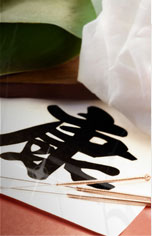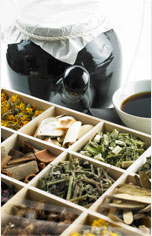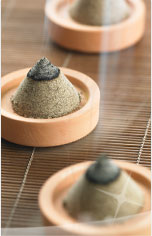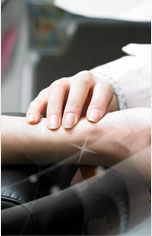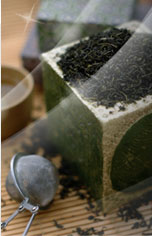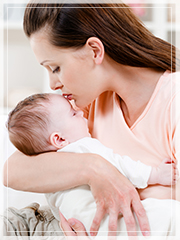
Being a new mom can trigger a jumble of powerful emotions, from excitement and joy to fear and anxiety. Most new moms experience postpartum "baby blues" after childbirth, which commonly include mood swings, crying spells, anxiety and difficulty sleeping. Baby blues typically begin within the first two to three days after delivery, and may last for up to two weeks.
About 10% of new moms experience a more severe, long-lasting form of depression known as postpartum depression. Postpartum depression signs and symptoms may include depressed mood, frequent mood swings, loss of pleasure, feelings of hopelessness, anxiety or panic attacks, loss of appetite, sleeping problems, low energy and difficulty bonding with baby. Symptoms usually develop within the first few weeks after giving birth, but may begin earlier (during pregnancy) or later.
Postpartum depression occurs for a variety of reasons, and some women may even be predisposed to the symptoms because of genetics. A dramatic drop in estrogen and progesterone after childbirth may contribute to postpartum depression. A drop in thyroid hormones after birth may cause depression symptoms as well.1
Untreated postpartum depression may last for many months or longer, and it can be dangerous for new moms and their children. If your condition persists for over two weeks or you have thoughts of harming yourself or your baby, seek professional help immediately.
Postpartum Depression in TCM
In Traditional Chinese Medicine (TCM), postpartum depression is a disturbance of mind resulting from Qi (the vital energy of the body) and Blood deficiency of the Heart. TCM believes that the mind and body are intimately connected. The exertion and loss of blood occurring at childbirth induce a state of Qi and Blood deficiency. Breastfeeding also consumes a lot of Qi and Blood. Since the Heart houses the mind and governs the Blood, and when the Heart is not getting enough nourishment from Qi and Blood, the mind has no residence and it becomes disrupted. This can manifest as disturbed sleep, palpitations, agitation, trouble concentrating, anxiety and depression.
NOTE: The names of organs are capitalized when referring to the entire, functional organ systems in TCM perspective: Liver, Blood, etc. The names of organs are lower-cased when referring to the distinct, biomedical organs: liver, blood, etc.
TCM Treatment for Postpartum Depression
Because the mind and body are intimately connected, TCM treatment focuses on calming the mind and relieving symptoms while addressing the root cause of postpartum depression by nourishing Qi and Blood and restoring the balance of Zang Fu organ systems.
TCM treatments for postpartum depression are unique for each patient, as every person has a unique constitution and imbalances. As a patient’s symptoms and issues change, the treatment will be adjusted accordingly. Healing time depends on the severity of symptoms and general health of the patient. Some patients report relief after just one session of acupuncture, while others may take up to several weeks to months to notice improvement. A typical treatment for postpartum depression consist of daily intake of Chinese herbal medicine combined with 1-2 acupuncture sessions a week, tapering as the patient's symptoms improve.
Acupuncture
Acupuncture is proven to be effective in treating depression and anxiety. It consists of stimulating specific points on the body by inserting fine, sterile needles. Acupuncture benefits both physical and mental/emotional functioning by promoting the smooth flow of Qi and Blood and restoring the balance of internal organs.
Many scientific studies and controlled clinical trials have been conducted to measure and explain the effects of acupuncture. The results of these studies have shown that acupuncture stimulates neurotransmitters involved in emotional regulation such as serotonin and endorphin, increases blood circulation, regulates reproductive hormones, alters pain receptor-pathways, and reduces inflammatory responses.
Studies show that acupuncture allows patients to regain their natural hormonal balance in a shorter time than those not treated with acupuncture, and acupuncture is also at least as effective as standard medicines given for postpartum depression. A study in 2014 concluded that acupuncture combined with psychological intervention has a similar total efficacy rate for the treatment of postpartum depression as the drug fluoxetine hydrochloride (Prozac®). Acupuncture plus psychological intervention had a 90.7% total effective rate, while fluoxetine hydrochloride had a 90.5% total effective rate. The researchers note that acupuncture did not cause any adverse reactions but fluoxetine hydrochloride caused nausea, dizziness, and loss of appetite.2
Chinese Herbs
In addition to acupuncture, Chinese herbal formulas are often prescribed to strengthen the mind, to nourish Qi and Blood, and to restore the balance of internal organs.
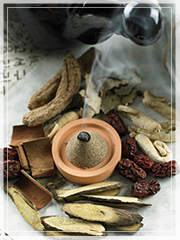 The Chinese herbs used most often to treat postpartum epression are:
- He Shou Wu (Polygonum root)
- Sheng Di Huang (Rehmannia root)
- Suan Zao Ren (Sour jujube seed)
- Yuan Zhi (Chinese senega)
- Bai Zi Ren (Chinese arborvitae kernel)
- Ren Shen (Ginseng)
- Dang Gui (Chinese Angelica root)
Chinese herbs are usually used in a combination of 2 to 30 herbs and are customarily prescribed for each patient. Herbs can be administered to a patient in many forms. Raw herbs can be taken on a brewed tea form. This herb tea form is strong and quick acting; however, it takes time for cooking and preparation and the taste can be quite strong initially. The herbs can also be prescribed in many other forms such as powder, capsule, pill, topical and tincture. Herbs possess many strengthening as well as therapeutic effects because of their content of various nutrients and vitamins, which are essential to the body. While Chinese herbal medicine can be very potent, it may take a few weeks to months before the full effects are noticed.
Lifestyle Tips
Get enough sunlight
Sunlight helps your body produce vitamin D, which is important and useful for fighting depression of any type. Spending some time outside in the sun each day will improve your mood and overall health. Alternatively, you can take vitamin D supplement.
Get more sleep and rest
Although it looks impossible to get a full night's sleep with a newborn, it is essential to rest as much as possible. When you sleep, your brain and body get to rest and take a break. Like the old adage, sleep when your baby sleeps and go to bed when your baby does. Leave the housework and other things until you feel rested and have the energy to deal with them. Splitting up nighttime duties, from feeding to changing to soothing your baby, with your partner is another way to get more rest. You can also ask a friend or family member for help.
Get regular exercise
Exercise can improve the symptoms of postpartum depression by increasing blood flow to the body and brain and stimulating endorphins. Meeting exercise goals or challenges, even small ones, can boost your self-confidence. Exercise and physical activity may give you the chance to meet or socialize with others. Just exchanging a friendly smile or greeting as you walk around your neighborhood can help your mood. Taking a short walk around the neighborhood while pushing your baby in the stroller, doing yoga while playing with your baby on the floor, or dancing in your kitchen while you prepare a meal will be a good start.
Have some personal time
Although your child needs a lot of effort and attention, you don’t need to do it all for all day, every day. You deserve to take care of yourself and have some personal time. Find someone you trust to take care of your baby and get out of the house for a couple of hours a week. Take the time to get your nails done, go to dinner with your spouse or friends, or even go to the grocery store alone. This will make you feel refreshed and help you get through those long days and nights of taking care of a baby.
Ask for help
As a new parent, you probably have every intention of doing everything right. But sometimes this can also feel as if everything’s riding on your shoulders. Avoid isolation and remember to ask for help. Accept any and all offers of help; have a list ready for errands that friends and family can run. If you need to talk to someone who understands precisely what you’re going through, consider participating in a postpartum depression support group in your local area/online or reaching out for support via phone/text. Knowing you are not alone and having a sense of community can do wonders for new mothers with postpartum depression.
|

